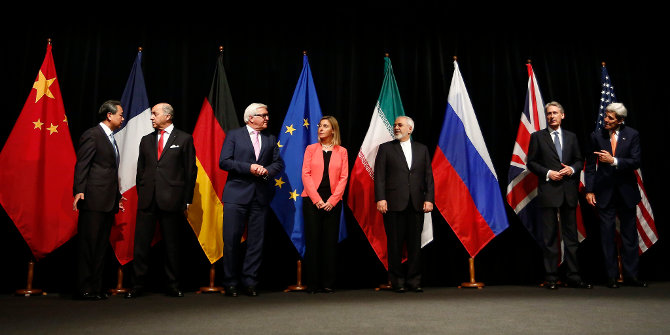 Recent political developments in Egypt and elsewhere in the Arab world, unthinkable even six months ago have resonated across the entire region. While the UK and the West may seek to encourage democratic reforms in other countries such as Yemen, Nima Khorrami Assl writes that a more active and engaging foreign policy in this area may in fact have the opposite effect to what is intended.
Recent political developments in Egypt and elsewhere in the Arab world, unthinkable even six months ago have resonated across the entire region. While the UK and the West may seek to encourage democratic reforms in other countries such as Yemen, Nima Khorrami Assl writes that a more active and engaging foreign policy in this area may in fact have the opposite effect to what is intended.
The fall of Zine el-Abidine Ben Ali and Hosni Mubarak has resonated across the Arab world, and in particular among young Middle Easterners, the majority of whom have lived under authoritarian rule for their entire lives. Underlying causes of unrest – inflation, unemployment, social injustice, and a lack of political liberty – are virtually present in all other Arab nations, and thus there is a growing concern among Arab and Western commentators alike about the possibility of another regime fall and the extent to which the current instability could be exploited by radical Islamists.
What is striking about recent events in the region is how irrelevant the West has been. Demonstrators have not taken to the streets because the West encourages them or enrages them. Grievances at home are fuelling the anger. Yet, there is a general consensus that Western preference for dealing with a strongman rather than a messy democracy has played a pivotal role in enabling Arab governments to postpone much needed social, political, and economic reforms.
This in turn has important implications for the British government’s strategy in Yemen – and the wider region by implication – where President Saleh, under pressure from the opposition and the general public, has finally decided not to run for the 2013 Presidential elections.
Yemen is a multifaceted country with diverse ethnicities, cultures, and religious affiliations where anti-Western sentiments are at a record high. There is a commonly hold belief among the public that Western support for the President has been a key factor in his ability to ignore and repress popular calls for change. As such, any direct British involvement in Yemen can give rise to the already tense anti-Western attitudes in the country with Britain being perceived as supportive of a regime that is greatly discredited among the public. Therefore, the British government should maintain a low profile in the country by focusing its energy on the articulation of a regional approach to Yemen’s political and economic miseries that limits its direct role to empowerment of Yemen’s naval forces and intelligence sharing only.
Migrants from Somalia and Ethiopia constitute a major threat to socio-political stability in Yemen by both draining state of resources and enhancing recruitment prospects for AQAP. Yemen’s open coastlines in combination with the lack of adequate governmental control over immigration has made Yemen a convenient transport and smuggling hub for various extremist organizations. In this way, it is not only the influx of people that constitute a threat but also the influx of ideologies and the rising possibility of emerging ties between AQAP and al-Shabab in Somalia.
Moreover, its naval inability to fight Somali pirates and the subsequent rise in the number of foreign fleets in the Red Sea and Gulf of Aden endanger Yemen’s national security in two other distinct ways thereby making force modernisation an absolute necessity.
Firstly, piracy increases the price of insurance for ships that are destined for the countries of the southern Red Sea, including Yemen, which will inevitably lead to an increase in the price of imported commodities such as food and raw materials.
Secondly, the continuous presence of a foreign fleet might eventually lead to demands from foreign governments to be given the right to use the Yemeni ports and territory. This, in turn, will prove to be a troublesome political dilemma for the Yemeni government: if it rejects Western demands, it may come under intense international pressure, endangering aid packages. On the other hand, if it accepts them, it will be exposed to domestic criticisms by AQAP followers and others for acquiescing to foreign interests.

In short, ongoing region-wide desire for political reform and democratisation provides Britain with a rare opportunity to reduce anti-western sentiments in the region by minimising its direct role in regional affairs and instead helping local actors to take a leading role in addressing security as well as social, political, and economic concerns.
Britain should limit its role to naval modernisation and thus assist the creation of a comprehensive set of regionally supervised policies in order to address socio-economic problems. GCC states, especially Saudi Arabia and the UAE, with their historically cultivated, tribal links to the Yemeni elites and prominent tribes, not only have the financial power but also the soft power to encourage the Yemeni government to implement painful political and economic reforms.
It will not be easy to persuade six Sheikhdoms to support and empower a Republic as this could have domestic repercussions for the Gulf States. One way of overcoming this problem, perhaps, is to present the need for their involvement in Yemen as a need for their leadership in containing regional terrorist threats and in preserving their own economic growth and security.
Click here to respond to this post.
Please read our comments policy before posting.






